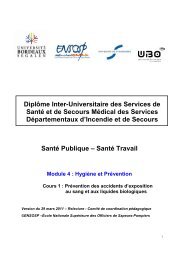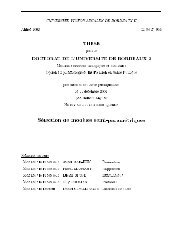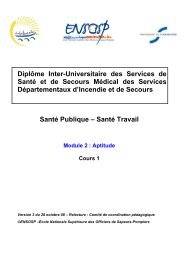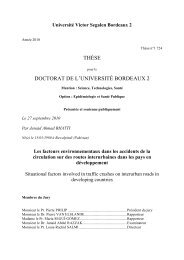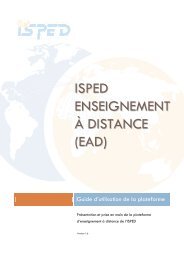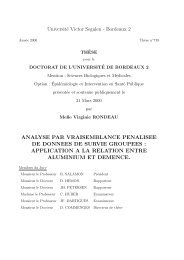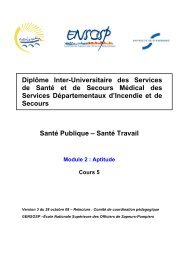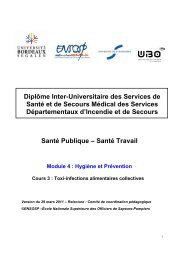Télécharger le texte intégral
Télécharger le texte intégral
Télécharger le texte intégral
Create successful ePaper yourself
Turn your PDF publications into a flip-book with our unique Google optimized e-Paper software.
WORD-STEM COMPLETION PRIMING IN AD 7Downloaded By: [Mil<strong>le</strong>t, Xavier] At: 10:57 4 November 2009Figure 3. Estimated effect sizes (and 95% CIs) of priming scores between Alzheimer’s disease (AD) patients and elderly control groupsin each encoding condition. Note: Area of the squares is proportional to the study statistical weight in the overall effect size.et al., 2001, Experiment 2). The meta-analysis conductedon 11 AD patients and 12 elderly controls yielded a smal<strong>le</strong>ffect size (–0.32, CI 95% [–1.14; 0.50]). Priming performanceswere not significantly different between thetwo groups.A sing<strong>le</strong> study involved an encoding conditionconsisting in counting vowels (Car<strong>le</strong>simo et al., 1999,Experiment 1). The meta-analysis conducted on 15 ADpatients and 15 elderly controls yielded a small effect size(–0.38, CI 95% [–1.10; 0.34]). Priming performances werenot significantly different between the two groups.For the studies involving an encoding condition consistingin providing a definition of the target words(Burke et al., 1994, Car<strong>le</strong>simo et al., 1999, Experiment 1;McGeorge et al., 2002; Partridge et al., 1990), the metaanalysisconducted on a total of 66 AD patients and 66elderly controls yielded a moderate effect size (–0.75, CI95% [–1.52; 0.02]). Priming performances were notsignificantly different between the two groups.For the studies involving an encoding condition requiringparticipants to read the target words (Beauregard et al.,2001, Experiment 2; Downes et al., 1996, Experiment 3;F<strong>le</strong>ischman et al., 1999; F<strong>le</strong>ischman et al., 1997; F<strong>le</strong>ischmanet al., 2001; Koivisto et al., 1998; LaVoie &Faulkner, 2008), the meta-analysis conducted on a totalof 188 AD patients and 161 elderly controls yielded asmall effect size –0.45, CI 95% [–0.75; –0.16]). Primingperformances in the AD patients were significantly lowerthan those exhibited by the elderly controls.Finally, a meta-analysis was conducted for the studiesinvolving an encoding condition requiring participants torate likeability (Arroyo-Anllo et al., 2004; Burke et al.,1994; Car<strong>le</strong>simo, Fadda, Marfia, & Caltagirone, 1995;Car<strong>le</strong>simo et al., 1998, 1999, Experiment 2; Downes et al.,1996, Experiments 1 and 3; F<strong>le</strong>ischman et al., 1999; Pasquieret al., 2001; Perri, Car<strong>le</strong>simo, Serra, Caltagirone, & TheEarly Diagnosis Group of the Italian InterdisciplinaryNetwork on Alzheimer’s Disease, 2005; Salmon et al.,1988, Experiment 1). The meta-analysis conducted on atotal of 267 AD patients and 290 elderly controls yielded astrong effect size (–0.86, CI 95% [–1.17; –0.55]). Primingperformances in the AD participants were significantlylower than those presented by the elderly controls.Publication biasWe assessed publication bias with Egger’s regressionasymmetry test. The analysis indicated that a publicationbias affecting the results of the present meta-analysis isunlikely (p = .11).DISCUSSIONThe present meta-analysis was designed to investigateword-stem priming in AD and the potential influence ofprocesses operating during study phase on the performancesexhibited by the patients. The first result thatcomes out of this study shows that when the data acrossencoding instructions are combined, AD patients manifesta significant priming effect ref<strong>le</strong>cted by the strongeffect size (1.15, CI 95% [0.95; 1.35]) between comp<strong>le</strong>tionrates obtained with the studied items relative to theunstudied ones. However, despite this positive influenceof previously studied items on later comp<strong>le</strong>tion rates, themagnitude of priming in AD appears definitely lowerthan that evidenced by the control group (–0.60, CI 95%[–0.79; –0.40]). This result is consistent with prior metaanalyses(Meiran & Jelicic, 1995; Russo & Spinn<strong>le</strong>r,1994) concluding that word-stem comp<strong>le</strong>tion priming isimpaired in AD patients. Moreover, after considering differentsets of studies according to the <strong>le</strong>vel of processing



